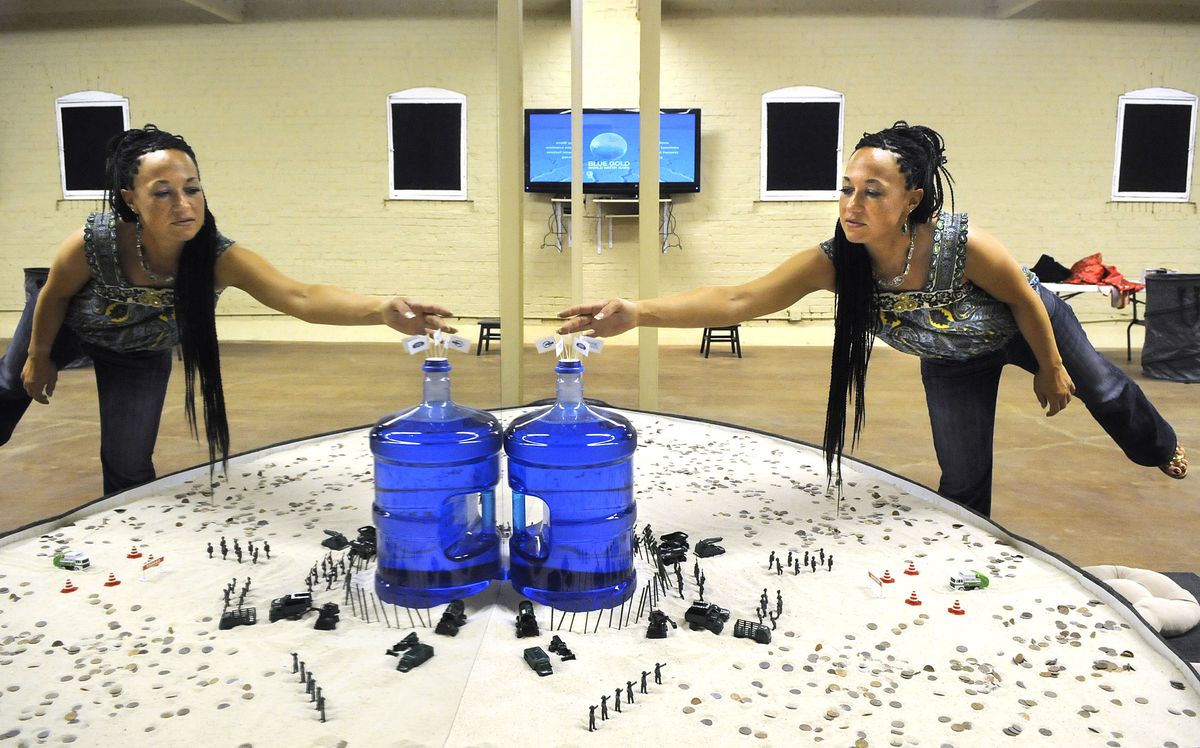Exhibit explores link between water, human rights
Rachel Dolezal adds final touches Tuesday to the “Water. Sex. China.” exhibit. The Human Rights Education Institute exhibit addresses the privatization of global water rights. (Dan Pelle / The Spokesman-Review)
An exhibit opening tonight at the Human Rights Education Institute in downtown Coeur d’Alene will ask visitors to consider what happens to human rights in a world of increasingly limited natural resources.
International water wars, overpopulation and gender issues all are raised in “Water. Sex. China.” It is the second exhibit in a two-year, four-part series examining the impact of globalization on human rights.
“More than anything, we’re trying to raise questions and people can come to their own conclusions,” said Rocky Owens, vice president of the institute’s board of directors. “Hopefully this can provide a visual stimulation to get people talking about some of these topics.”
The six-month exhibit will be paired with keynote speeches this fall. Dune Lankard, a Native commercial fisherman spurred to activism after the Exxon Valdez oil spill, will speak at North Idaho College on Sept. 22. Pete McCloskey, the former California congressman who co-authored the Endangered Species Act and co-founded Earth Day, will speak Oct. 6.
The exhibit is a departure from what the institute has done in the past, with more traditional displays, said Rachel Dolezal, the artist and the institute’s education director. Using film, installations and a growing lawn, the institute hopes to encourage thought about how restricted resources and overpopulation affect human rights.
“Can you just go in and buy an aquifer, buy a lake, when people are depending on it?” Dolezal said. People who live in an area where water resources are depleted, she said, “can’t just jump on a plane and go somewhere else. The right to life is a part of all of this, as far as clean food and water.”
One installation shows 100 Coke cans arranged, À la Andy Warhol, in perfect symmetry. Each one contains a straw shaped like a cross to illustrate the impact companies have when they purchase water rights for commercial purposes, forcing people to walk miles for drinking water. Another installation features a 5-gallon jug of water pierced with the flags of the largest international water rights holders and protected by soldiers in a desert.
A live green lawn surrounded by a white picket fence grows in the middle of the exhibit, suggesting that visitors consider their own water use while people in other parts of the world struggle to secure drinking water.
Big-screen TVs will show “Blue Gold,” a documentary about world water wars, YouTube videos on population growth, and a Chinese film called “Shower,” a comedy with tragic moments about that country’s bathhouse culture. In one segment, a family trades bowls of food for water to provide a daughter with a bath.
Additional films with more adult topics, including torture and gender issues, will be shown in a “viewer discretion” room.

